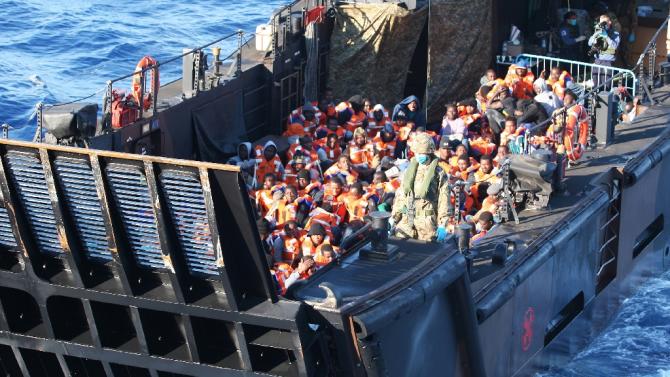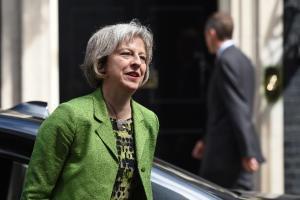Date: Wed, 13 May 2015 18:23:49 +0200
London (AFP) - Economic migrants who attempt to reach the European Union by crossing the Mediterranean should be turned back, Britain said on Wednesday, even as the Royal Navy rescued 445 people packed into inflatable boats.
Home Secretary Theresa May's comments come amid an EU row over how to address a crisis that has seen thousands of migrants drown fleeing conflict and poverty in North Africa and the Middle East.
In an article in The Times newspaper, May also said that a proposal for EU states to accept a binding quota of refugees would only encourage more to make the dangerous sea crossing.
"The EU should work to establish safe landing sites in North Africa, underpinned by an active programme of returns," she wrote.
She added: "I disagree with the suggestion by the EU's high representative, Federica Mogherini, that 'no migrants' intercepted at sea should be 'sent back against their will'.
"Such an approach would only act as an increased pull factor across the Mediterranean and encourage more people to put their lives at risk."
Her comments came as the European Commission, the EU's executive arm, was due to unveil plans for a mandatory redistribution of asylum seekers across the bloc.
Britain and Hungary are opposed to the plan, and special arrangements under which Britain, Ireland and Denmark could choose not to participate mean the proposal may be sunk, European sources have said.
Britain last year refused to contribute to an EU search and rescue mission in the Mediterranean, arguing they would only encourage more migrants.
However, a Royal Navy ship has been helping rescue efforts for the past fortnight and on Wednesday rescued 445 people from four inflatable boats, according to the defence ministry.
The ministry released photographs and video footage of sailors from HMS Bulwark throwing life-jackets to the occupants of the packed boats before pulling them onto one of the ship's landing craft.
The migrants will be taken to Italy.
In a BBC interview, May said the priority should be to deal with the people traffickers who brought the migrants across the Mediterranean.
And she highlighted the £800 million ($1.25 billion, 1.12 billion euros) that Britain had spent on aid for Syrian refugees in the region.
"Europe is not going to be able to accommodate the several million people who have been disrupted from Syria, many of whom actually want to be able to stay in the region and to be able at some stage to go home," she said.
"The best way to help those is what we as a government are doing -- £800 million, helping in those refugee camps."


